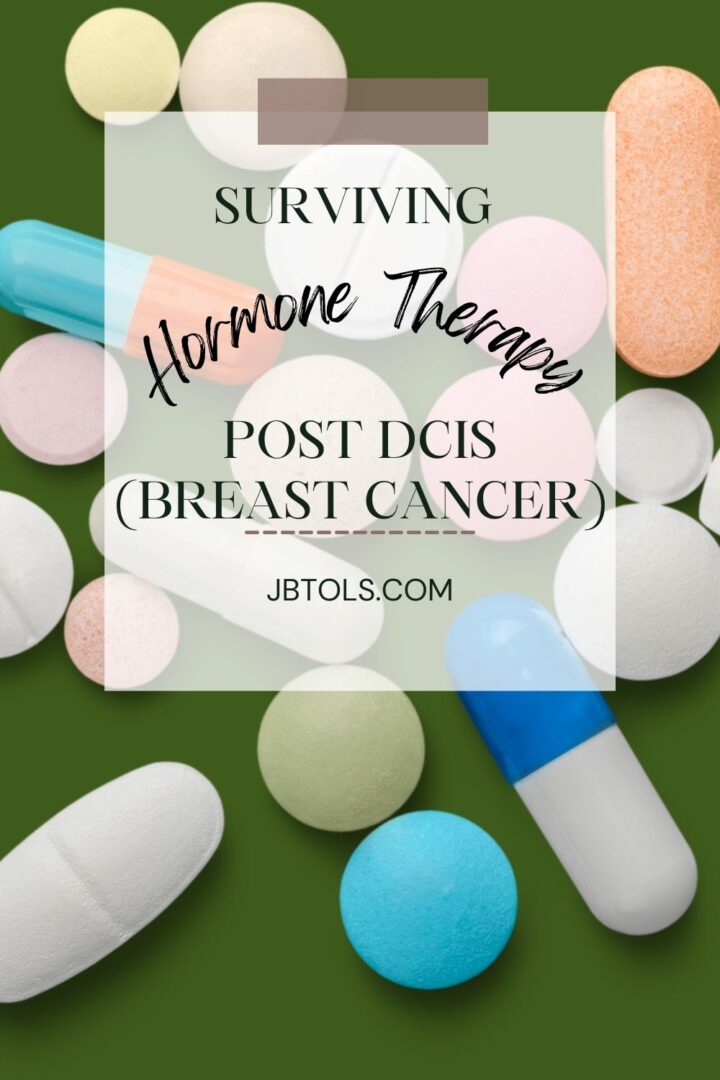August 8, 2024
In March 2023, I received a life-changing diagnosis: Ductal Carcinoma In Situ (DCIS), a form of breast cancer. My doctors informed me that my cancer was ER+ (Estrogen Receptor Positive). This means that the cancer cells in my breast have receptors for estrogen and progesterone. When these hormones bind to the receptors, they encourage the cancer to grow. As well, since my cancer is hormone receptor-positive, meaning it reacts to these hormones, this makes a big difference in how it’s treated. Since it responds to estrogen, it was important for the doctors to start me on hormone therapy to lower the estrogen in my body.
You can read about my experience with breast cancer at My Experience with Breast Cancer (DCIS).
ESTROGEN IN THE BODY
Estrogen is a crucial sex hormone that plays a significant role in various bodily functions. While the majority of a woman’s estrogen is produced by the ovaries, it is also synthesized in smaller amounts by the adrenal glands and fat cells. As I aged, my natural estrogen levels began to decline. However, my doctors were concerned about the potential for estrogen to bind with protein receptors in my breast tissue, which could pose health risks. To mitigate this, they recommended further reducing my estrogen levels to minimize the chances of this interaction occurring.
CHOOSING MY HORMONE THERAPY
TAMOXIFIN
Shortly after completing my radiation therapy, I sought the expertise of an endocrinologist and their nurse practitioner. During our consultation, they carefully evaluated my situation and recommended that I begin taking Tamoxifen, a medication specifically tailored to address my needs. They determined that Tamoxifen was the most appropriate course of treatment for me, designed to reduce the risk of cancer recurrence. I was advised to adhere to this treatment plan for the next five years. If, at the end of this period, there are no signs of cancer returning, I would be considered to be in full remission.
For the first few weeks on Tamoxifin, I did great and felt great.
But, after the first few weeks, I hit the wall! The symptoms came on quick.
- Hot flashes
- Weight gain
- Body aches
- Low libido
- Brain issues
- Inability to concentrate
- Memory loss
- Compromised decision making
- Fatigue
The hot flashes I experienced were absolutely overwhelming. They came one after another, leaving me no respite. Each day became a struggle as I battled constant heat waves. Simple tasks like blow drying my hair or applying makeup became daunting challenges due to the intense heat. I often found myself drenched in sweat, making it difficult to stay comfortable throughout the day. Despite the ordeal, we managed to find moments of humor. My son, typically clad in just gym shorts around the house, suddenly started complaining about feeling cold for the first time!
TURNING POINT
After several months on this medication, my doctor suggested that I temporarily discontinue it for a month or two. The idea was to see if a cyclical, on-and-off regimen might better suit my needs. Although this approach was intended to offer some flexibility, it quickly became apparent that it wasn’t working for me. I struggled immensely during this period, feeling as though my body was in a rapid and alarming decline every single day. The overwhelming sensation was so intense that the only way I could describe it to my doctor was that I felt like I was slowly dying. Exhausted from this constant battle and desperate for relief, my doctor and I made the decision to switch to a different medication.
ARIMIDEX
Arimidex is only available to women who are already in menopause. So, my doctors had to test to make sure that I was indeed in menopause. Once it was determined that I was, they started me on the medication.
I was very pleasantly surprised by how well I felt. I remember my first conference call with my doctor and my telling her how normal I felt. We both had so much hope that this was going to be the medication that my body tolerated.
However, I spoke too soon. Within just a week or two after our initial consultation, I began to experience an alarming decline in my strength. I became so weak that even the simplest tasks, like getting into the shower, felt nearly impossible. Once I was in the shower, I found myself struggling to stand, overwhelmed by a profound sense of weakness that left me feeling deeply frightened. Despite my fears, I continued taking the medication for a while longer, only to be met with an increasing array of symptoms. The body aches and joint pain from both medications grew to be unbearable, compounding the physical and emotional toll I was already enduring.
- Weight gain
- Body aches
- Fatigue
- Severe weakness
- Vaginal dryness
- Low to no libido
FINAL THERAPY
After voicing my concerns to my doctor, I was promptly scheduled for additional blood tests and a follow-up consultation. During this meeting, my doctor reassessed my treatment plan in light of my recent difficulties. She suggested that I might try a regimen of taking the medication for a few months, followed by a few months off, to see if this approach would be more manageable. However, she also offered the option of discontinuing hormone therapy altogether, given my stage 0 diagnosis and the significant challenges I was facing with the medication. Even before she could finish her sentence, I knew what I wanted—I immediately expressed my desire to stop the medication entirely and pursue a more holistic approach to my health. I felt reassured knowing that my medical team supported me in this decision, giving me the confidence to move forward on this new path.
I have met people who have been on one of the two therapies above and done very well. As well, I have followed people on social media who have done one of the two therapies above and done well, too. I was just not one of the people who could tolerate antiestrogen medication.
It was not worth it to me to live every single day feeling like I was dying to improve my odds of staying cancer free.


Comments